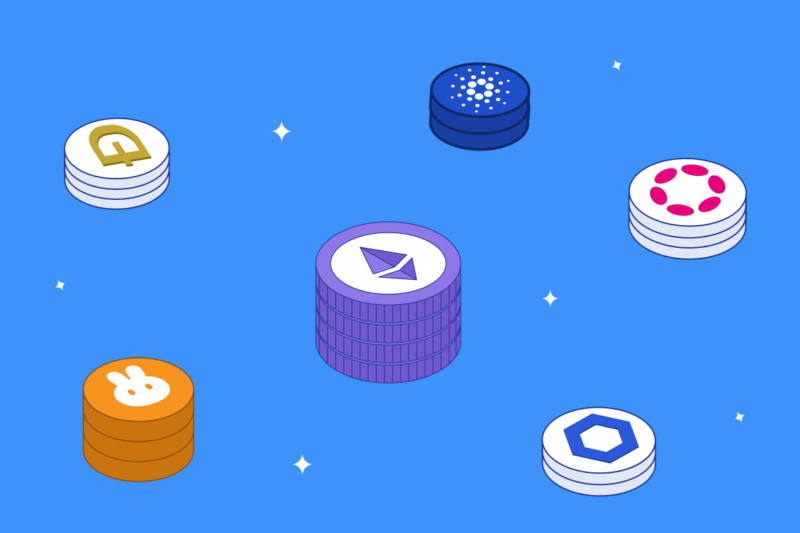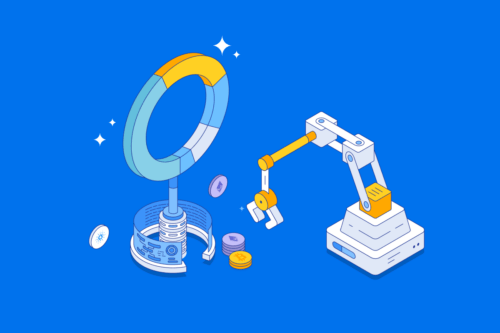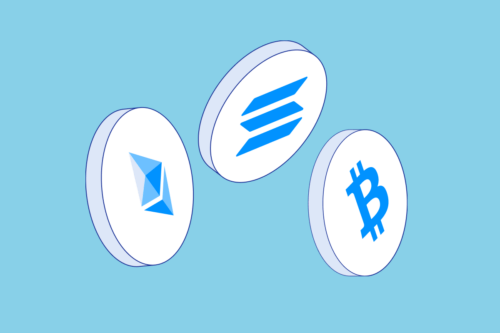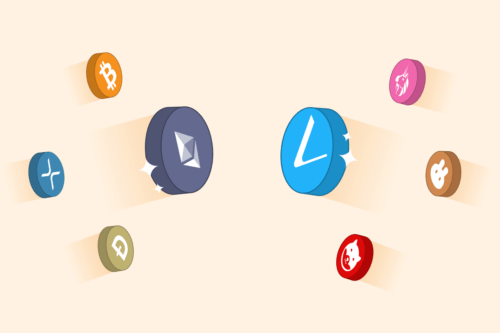
Bitcoin was the first cryptocurrency, and as such, it is seen as the “primary” or most important crypto. But there are over 20,000 cryptocurrencies on the market and almost all of those are altcoins. So what is an altcoin? This article will explore what altcoins are and how they work. It will also look at the different types of altcoins, what makes them different from Bitcoin, and the pros and cons of investing in altcoins.
What are altcoins?
The most rigid definition of an altcoin (short for “alternative coin”) is any coin that is not Bitcoin. For example, Litecoin, Dogecoin, Solana. Most definitions, however, describe any coin or token that is not Bitcoin or Ethereum as an altcoin. This is because Ethereum has a huge market capitalization, is widely used around the world, and is constantly improving. Some experts predict that Ethereum will claim a significant portion of Bitcoin’s market share in the next five to ten years. Others even believe that Ethereum will overtake Bitcoin as the biggest cryptocurrency in that time!
Every altcoin has a different origin story, development team, and community. Many altcoins have a specific utility and others aim to solve a particular problem. Some of these will prove to be highly innovative and achieve widespread adoption. This generally translates to significant increases in price over time. Certain altcoins, however, will turn out to be useless, not as relevant as competitors, or straight-up scams.
Did You Know?
Namecoin was the very first altcoin. It was released in 2011, two years after Bitcoin. Namecoin was developed to improve the security and privacy of the internet and to attempt to decentralize its infrastructure. Namecoin was a promising project, however ultimately its success was overshadowed by other early altcoins, such as Litecoin, Ripple, and Ethereum.
Altcoins vs Bitcoin
Cryptocurrencies are built upon distributed ledger technology (DLT). The most popular example of this is blockchain technology. This is a distributed database of information and transaction data that is verified and maintained by a network of computers around the world. This is true for Bitcoin and Ethereum, and it is also true for most altcoins as well.
Altcoins aim to improve upon Bitcoin or Ethereum, or to offer services that these cryptocurrencies cannot. Some coins, such as Litecoin, were built using almost identical source code to Bitcoin. Litecoin is also a payment coin that can be used to pay for goods and services. However, Litecoin was designed to have much cheaper and quicker transactions than Bitcoin, which is its key selling point.
There are a number of popular payment coins on the market. But many altcoins actually have different use cases altogether, which range from enabling smart contracts and proving ownership of digital assets to supporting decentralized exchanges or Metaverse platforms. The variety of coins and tokens in the altcoin market and the level of innovation are truly limitless.
Should I invest in altcoins?
Many altcoins present a fantastic investment opportunity. If you pick the right altcoins to invest in and buy at a good price, your return on investment will be extremely high. Unfortunately, as there are over 20,000 altcoins on the market it can be difficult to pick the projects that will be successful in the long term. So instead of trying to pick winners, try to just invest in solid projects.
It is important that you thoroughly research any potential investments, which can include looking at things like use cases, market cap, road maps, and adoption. You might also want to consider learning technical analysis to assist in identifying trends in crypto markets and to make more informed investment decisions.
Pros and cons of altcoins?
Pros
Involvement in new technology
There is a lot of innovation happening in the crypto and blockchain spaces. Most of this occurs within the altcoin markets. People who invest in altcoins are often early adopters who want to be involved with exciting new applications of blockchain technology.
Better return on investment potential
Altcoins have the most attractive return on investment in the cryptocurrency market, particularly small-cap ($300 million to $2 billion market cap) and micro-cap coins ($50 million to $300 million). These smaller altcoins are the ones that pump the hardest during the bull market or if they achieve widespread adoption.
Advanced money
Altcoins can support more complex functions than traditional money. For example, owners of specific altcoins can participate in the governance of the network.
Cons
Market volatility
Cryptocurrency in general is very volatile. Nowhere is this more evident than in the altcoin market, where coins can see huge gains or losses in a short amount of time. Sometimes this is due to organic market conditions, and other times it is due to widespread narratives or celebrities like Elon Musk tweeting about certain crypto assets (most often meme coins).
Complexity
Buying and storing cryptocurrency often requires above-average computer knowledge. For instance, microcap coins that aren’t listed on major exchanges are more difficult to purchase as they require you to set up your own wallet and connect it to a decentralized exchange. That said, most crypto exchanges and brokerages are designed to be very user-friendly, with storage options on-platform.
Types of altcoins
There are many different types of cryptocurrency tokens in the altcoin market. The most common types of altcoins are utility tokens, stablecoins, non-fungible tokens (NFTs), governance tokens, and security tokens. Utility tokens serve a specific purpose, like being a means to pay for platform services. Stablecoins are non-volatile digital currencies pegged to fiat currencies and real-world assets like precious metals. NFTs represent unique digital assets and prove ownership. Governance tokens allow stakeholders to vote on network proposals and upgrades. Security tokens are digital contracts for portions of an asset that already has value, like corporate stocks or real estate for instance.
Popular altcoins
Ethereum
Ethereum is a programmable smart contract and decentralized applications (dApps) platform. Ethereum is at the heart of decentralized finance (DeFi). It’s native currency, Ether (ETH), is used to pay for services on the Ethereum network.
Tether
USD Tether (USDT) is the largest stablecoin in the crypto market and can be used globally to buy crypto. It is said to be pegged one to one with the U.S. dollar. The only other stablecoin with a comparable market cap is USD Coin (USDC), which is also pegged to the U.S. dollar.
Polkadot
Polkadot is a platform that provides solutions to the common blockchain problems of scalability and cross-chain collaboration. Polkadot uses the currency DOT to pay for network services. Users can also stake DOT for rewards.
Chainlink
Chainlink is a protocol that provides data and information from off-chain sources to on-chain smart contracts via a decentralized network of special nodes known as oracles. The network uses the LINK token, which is built upon the Ethereum blockchain network.
Dogecoin
Dogecoin is a popular meme coin that runs on its own blockchain network. It is actually one of the oldest existing altcoins. DOGE can be used to pay for goods and services at participating retailers.
Did You Know?
Tesla is currently accepting DOGE to pay for merchandise. It is expected Tesla will accept DOGE as payment for their cars in the near future.
Solana
Like Ethereum, Solana is a smart contract and dApps platform, but its selling point is that it is much faster and cheaper than Ethereum. The network uses the SOL crypto coin.
Decentraland
Decentraland is a 3D virtual reality platform built on Ethereum that is occupied by players all over the world. Users can buy and sell virtual real estate and other items using the currency MANA, interact with other players, explore the virtual world, and play games on that platform.
How to buy altcoins
Buying altcoins is available through most major exchanges. Swyftx is a popular crypto exchange in Australia and New Zealand where users can buy over 300 different altcoins with low fees and automatically store them in their own personal Swyftx wallets.
Tip
All exchanges list the big coins like Bitcoin and Ethereum, but many small-cap and micro-cap coins are only available on smaller or decentralized exchanges (DEXs).
Summary
Altcoins are alternative coins to Bitcoin. The altcoin market is where most of the exciting innovation in cryptocurrency happens and it also has the potential to provide the best returns on investment. But the market can also be very volatile and nowhere is this felt more than in altcoins. Bitcoin remains the king of the cryptocurrency world, but altcoins are a force to be reckoned with.
To learn more about the types of cryptocurrencies, investment strategies, smart contracts, dApps, and plenty of other crypto-related topics, continue exploring Swyftx Learn!
Next lesson
Disclaimer: The information on Swyftx Learn is for general educational purposes only and should not be taken as investment advice, personal recommendation, or an offer of, or solicitation to, buy or sell any assets. It has been prepared without regard to any particular investment objectives or financial situation and does not purport to cover any legal or regulatory requirements. Customers are encouraged to do their own independent research and seek professional advice. Swyftx makes no representation and assumes no liability as to the accuracy or completeness of the content. Any references to past performance are not, and should not be taken as a reliable indicator of future results. Make sure you understand the risks involved in trading before committing any capital. Never risk more than you are prepared to lose. Consider our Terms of Use and Risk Disclosure Statement for more details.

 Article read
Article read



